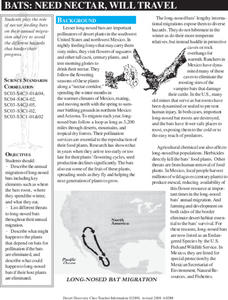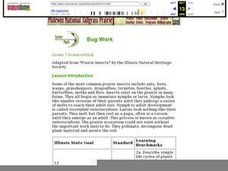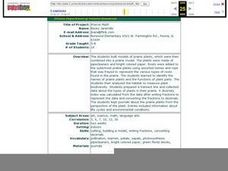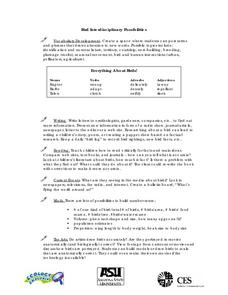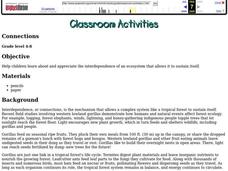Curated OER
Getting a Handle on Your Bee
Students observe dried bees, carefully glue them to toothpicks, and use them for cross pollinating their Brassica plants. They also describe reasons why two similar investigations can produce different results. Finally, students...
Curated OER
Observing Pods
Students observe the pistil growing into a tiny string bean-like seed pod. They then observe the development of the fertilized pods between Day 17 and Day 35 and record their observations by drawing and labeling, writing, and graphing. ...
Curated OER
Plant Structure and Function
Young scholars examine the structure of Velcro and its function then relate it to seeds and seed stock. For this experimental lesson students test seed activity and what its function is for the plant, examine seeds under a...
Curated OER
Bats
Students examine the migration patterns of the long-nosed bat. They identify threats to the animal and the plants bats help pollinate. They participate in a game to help them with the information.
Curated OER
Bats: Need Nectar, Will Travel
Beginning wildlife biologists become adult bats, baby bats, snakes, owls, bobcats, or land-clearing developers in a grand role-playing activity. In a large open space, they play a game in which they move to designated areas based on what...
National Wildlife Federation
Habitat Web
Young scientists weave together an understanding of ecosystems with this fun collaborative activity. Taking on the roles of different living and non-living elements of specific habitats, learners use a ball of yarn to create...
Kentucky School for the Deaf
Levels of Organization within an Ecosystem
From tiny organisms to entire biomes, young scientists examine the interdependent relationships tying all living and non-living things together with this collection of ecology resources.
EngageNY
Posing Statistical Questions
Is this a statistical question? The opening lesson plan in a series of 22 introduces the concept of statistical questions. Class members discuss different questions and determine whether they are statistical or not, then they sort the...
American Museum of Natural History
Bio-Benefits
Kick-start a discussion of the importance of biodiversity with a colorful resource that touts the benefits of maintaining healthy ecosystems. The images stress the interdependence of all the elements of an ecosystem.
PBS
Season Seeking
It's a time of change. A hands-on activity engages young scientists in a lesson highlighting the change of seasons. They brainstorm indicators of season changes in nature and then look for them. Next, they record observations in a field...
Curated OER
The Sweet Connection
Students use maps to find what crops are dominant in areas where honey bees are raised and discuss possible correlations. They mark the top ten honey- producing states on a US map.
Curated OER
Bug Work
Young scholars explore the life cycles of insects and how they interact with each other in the prairie to create a healthy ecosystem and viable food chain. They list animals or insects in their own community that are similar to the...
Curated OER
Seed Dispersal
Pupils explore seed dispersal by designing their own wind dispersed seed structure. Using one piece of paper and a box fan, they construct a seed dispersal structure, record the distance their seed travels, and answer discussion questions.
Curated OER
Prairie Math
Students work together to build models of prairie plants. Using the model, they estimate the height and then measure them using metric and standard units. They write a fraction to represent their part of the whole set and compare and...
Curated OER
Symbiosis: Help, Hinder or Destroy
Use background information and vocabulary to familiarize your students with the concept of symbiosis and the role agriculture plays in the shared relationship. They then write the vocabulary in their lab books or journals, and read the...
Curated OER
Bird Interdisciplinary Possibilities
Students explore birds, their territory, breeding, and seasonal movement. They research and collect information on birds through writing letters to ornithologists, reading in books, comparing web sites, and observing pictures. Students...
University of Wisconsin
A Rain Garden Year
Pupils become plants in an interpretive play that depicts what happens throughout the seasons in a rain garden. As you narrate, students bloom, flower, and go to seed accordingly. The lesson is first in a series of lessons written for...
Curated OER
Flower Power
Young scholars explore the parts of flowers and how they reproduce. They dissect flowers and observe the reproductive organs. Students observe anthers and ovaries of Tiger Lilies under a microscope. They investigate how insects and...
Curated OER
Honeybees are Vanishing
Students decide if they agree with a series of statements about the bee population, then read a news article about the disappearance of millions of U.S. honeybees. In this biology and current events lesson, the teacher introduces the...
Curated OER
Flower Power
Young scholars explore parts of the flower. In this plant biology lesson, students dissect flowers and identify how the seeds are formed. Young scholars take a nature walk to pick flowers for future dissections.
Curated OER
Flower Structure and Reproduction
In this plant science worksheet, students color and label the different parts of the flower. They write short answers to 14 questions about flowers.
Curated OER
Brays Bayou Spiderwort Genetic Study
Students formulate hypothesis based upon data gathered by examining possible crosses of spiderworts using Punnett squares. They present explanations for physiological adaptations of spiderworts that resulted from interactions within the...
Curated OER
CONNECTIONS
Students study the interdependence of an ecosystem that allows it to sustain itself. They examine the Western lowland gorillas for an example.
Curated OER
WHAT'S ORGANIC?
Students explore how certain foods come to be certified "organic." They write the words "organic" and "synthetic" and given the definitions of each. Students are given dictionaries. They are asked: "What is organic food?" Students grow...
Other popular searches
- 2nd Grade Pollinators
- Plant Pollinators Insects
- 1st Grade Pollinators
- Plants Pollinators
- 6th Grade Pollinators
- Plant Pollinators
- Plants and Pollinators
- Pollinators Decline
- Power of Pollinators
- Flowers Pollinators
- The Power of Pollinators






